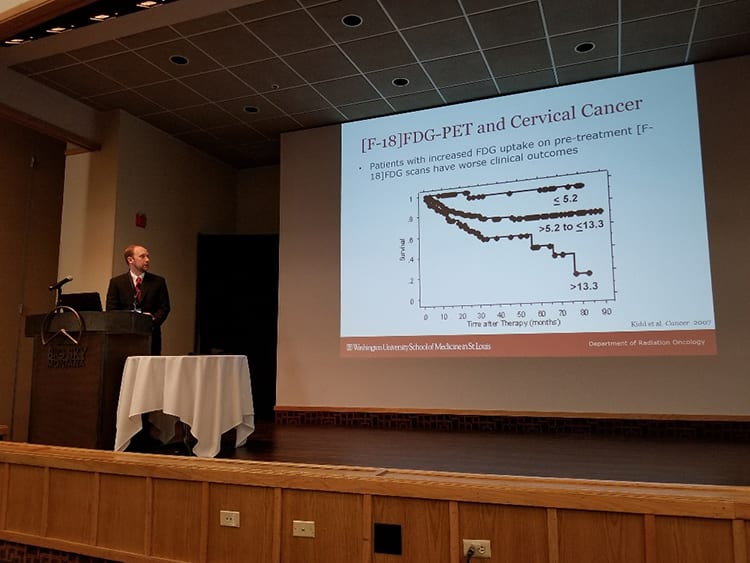
Tell me about your background.
I’m from Minneapolis, Minnesota. I went to Carleton College in Northfield, MN for my undergraduate, and the University of Wisconsin-Madison for graduate school and medical school.
What led you to study at Washington University?
Wash U is a world class research and clinical institution with a strong history in imaging science, my area of interest.
What are your future career goals?
I would like to be a physician scientist, splitting my time between research and clinical work.
Tell me about your research.
I am investigating imaging probes and methods to image reactive oxygen species and the reducing potential of cervical cancer cells. The ultimate goal of the project would be to develop imaging markers that can predict if a cancer will respond to radiation therapy, or novel therapies targeting redox pathways to increase oxidative stress and potentially increase sensitivity to radiation. I have some promising preliminary data in cell cultures, and am actively performing small animal experiments to see how well these results carry over into in vivo imaging.
What has been the most challenging aspect of this project?
My undergraduate and graduate degrees were both in physics. I have had to learn a lot of new methodologies and techniques to get more at the biology, which has been challenging, but I enjoy learning new things.
Was there something in particular that led you to this subject of research?
I wanted to gain a better understanding of the biology responsible for imaging findings, and use that knowledge to develop better imaging probes and methods. This project seemed to be a good opportunity to do that.
Tell me about your conference experience.
The RRS/AACR Winter Workshop was a great meeting. There were consistently great talks and plenary sessions, and the attendees were very engaged. The meeting very much had a workshop feel. People were very collaborative and provided helpful suggestions, and as a smaller conference, attendees had a lot of opportunities to interact. The theme of the meeting was targeting cancer metabolism, and though some of the research presented was a bit outside my background in basic imaging science, it was all very relevant to what I’m currently working on. I learned a lot, and the meeting helped give me a lot of ideas of future applications or directions for my research. The meeting was also in a beautiful location, Big Sky, Montana, with lots of opportunities for outstanding skiing, including cross country skiing, which is one of my favorite outdoor activities.
What are your future plans for this subject/study?
I would like to continue to explore the biology underlying the imaging results I have seen, use that understanding to develop better therapies and target those therapies to the appropriate tumors. I also hope to someday translate some of my findings to human patients.
John Floberg is a member of the Schwarz Lab.